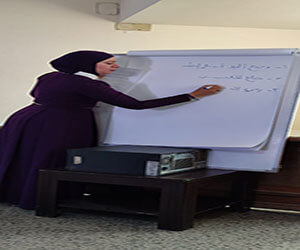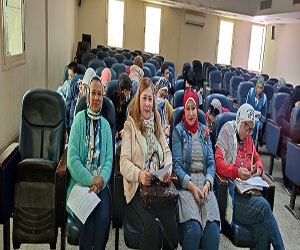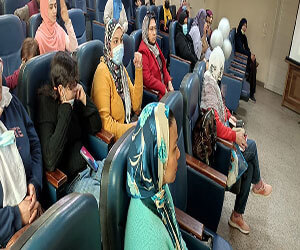Embarrassing behavior among autistic children and children with special needs... A seminar at the Faculty of Postgraduate studies for Childhood
The Community Service and Environmental Development Affairs Sector at the Faculty of Graduate Studies for Childhood at Ain Shams University organized a symposium entitled “Embarrassing Behavior among Autistic Children and Children with Special Needs”, at the headquarters of the Center for People with Special Needs affiliated to the faculty, under the auspices of Prof. Dr. Mahmoud El-Metini, President of the University, Prof. Dr. Hesham Tamraz Vice President for Community Service and Environmental Development, Prof. Dr. Howaida Al-Gebali, Dean of the Faculty, and the organization and supervision of Prof. Dr. Randa Kamal Abdel Raouf, Vice Dean for Community Service and Environmental Development, and Prof. Ahmed Al-Kahki, Director of the Center for People with Special Needs.
Dr. Amira Omar, Head of the Self-Care Unit at the Center for People with Special Needs, attended the symposium. The symposium targeted mothers from outside and inside the center. It included the meaning and definition of embarrassing behavior, its types, causes, methods of dealing with it, and managing such behaviors at home and outside.
 |
 |
 |
||
Prof. Dr. Randa Kamal, Vice Dean of the Faculty, in her speech during the events, stressed the need for awareness-raising directed to the community in all its categories, as there are syndromes and disorders that produce involuntary movements such as Tourette’s syndrome, which push people to stay away from them, especially their peers of children, noting that community awareness helps to integrate these children and raise the embarrassment of parents of children with special needs.
Prof. Dr. Randa Kamal stressed the necessity of representing all categories of children with disabilities in the media and not limiting them to specific categories only.
Dr. Amira Omar, Head of the Self-Care Unit at the Center for People with Special Needs, provided examples of proper ways to deal with children in different situations, through a presentation, interaction and exchange of experiences among the audience. She also addressed how to employ some embarrassing behaviors and benefit from them in acquiring new skills for children with special needs.
The attendees expressed their gratitude for the content of the symposium and called for holding more seminars and workshops in the field of people with special needs, to help them deal effectively and positively with their children.


.svg)




